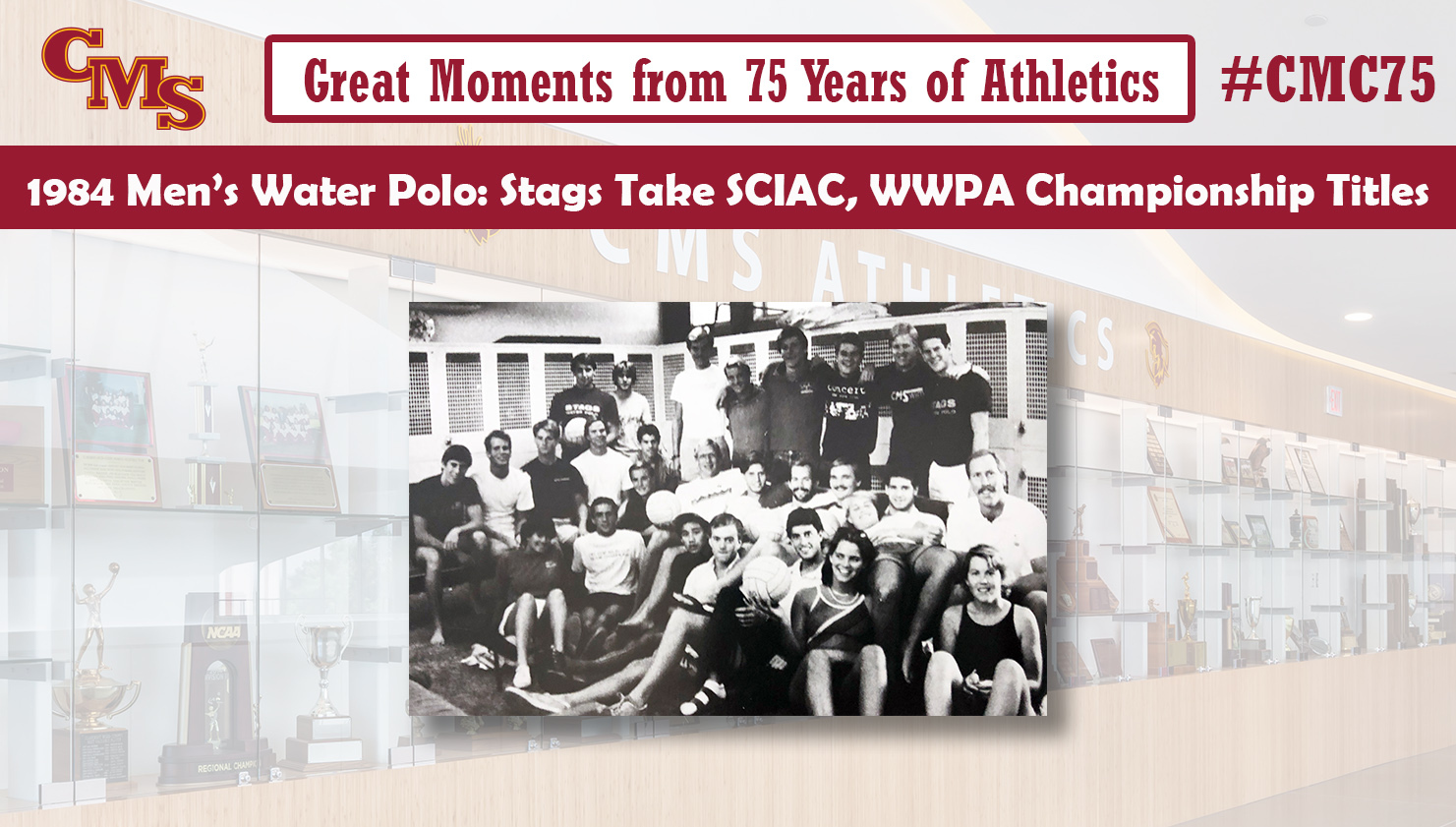
CMS75 Moments: 1984 Men's Water Polo Beats UCSD 6-4 For First Western Water Polo Title
As part of the buildup to the 75th Anniversary celebration for Claremont McKenna College (visit CMC's 75th Anniversary Countdown Page to learn more), we are reliving many of the great moments from CMS athletic department history over the 75-day countdown from April 17 to July 1. If you were a part of this great moment and would like to add to the memories, or if you would like to submit your memories of your own favorite CMS Athletics moment, fill out the form on our main 75th Anniversary page.
Great Moments from 75 Years of Athletics
2009 Men's Water Polo: CMS 6, UC San Diego 4 (WWPA Finals)
The CMS men's water polo program already had eight SCIAC Championships under its belt, including the last two, when the 1984 team first took to the pool in September. The Stags, though, managed to take that success to an even higher level. The 1984 squad became the first (and still the only) CMS men's water polo team to reach the 30-win plateau, finishing with a 31-6-1 record. Almost all of the blemishes came in an early-season tournament at UC Irvine, with the host Anteaters joining UC Davis, Stanford and Loyola on the short list of mostly Division I programs to take a win over the Stags, while the first meeting with UC San Diego ended in a 4-4 tie.
CMS tolled to a 10-0 SCIAC record, with the closest win being a 13-9 victory over Pomona-Pitzer, which was the third straight undefeated season in SCIAC play for the Stags (a streak which would extend to 11 seasons in a row). CMS then headed to the Western Water Polo Association Championships, where it rolled through the first four matches (including another meeting with Pomona-Pitzer), and met up with UC San Diego in the championship.The finals represented a rematch of the 1983 WWPA championship between the two closely-matched rivals, which the Tritons won 7-4. The Stags were also 1-1-1 against UC San Diego in the 1984 regular season, with all three matches decided by less than two goals. The same was true of the championship, but the Stags got the early upper hand, taking a 4-1 first-half lead, and used a stingy defense to prevail in the rubber match 6-4 to bring home their first-ever WWPA crown.
Mark Grinis, Brad Munroe and Bill Johnson were named to the All-SCIAC first team, while Tom Jedrzejewicz was chosen to the second team. Jedrzejewicz, Tim McNaughton, Todd McKenzie and Bob Moore have all been inducted into the CMS Hall of Fame from the 1984 team, who were all a part of four perfect 10-0 SCIAC seasons.
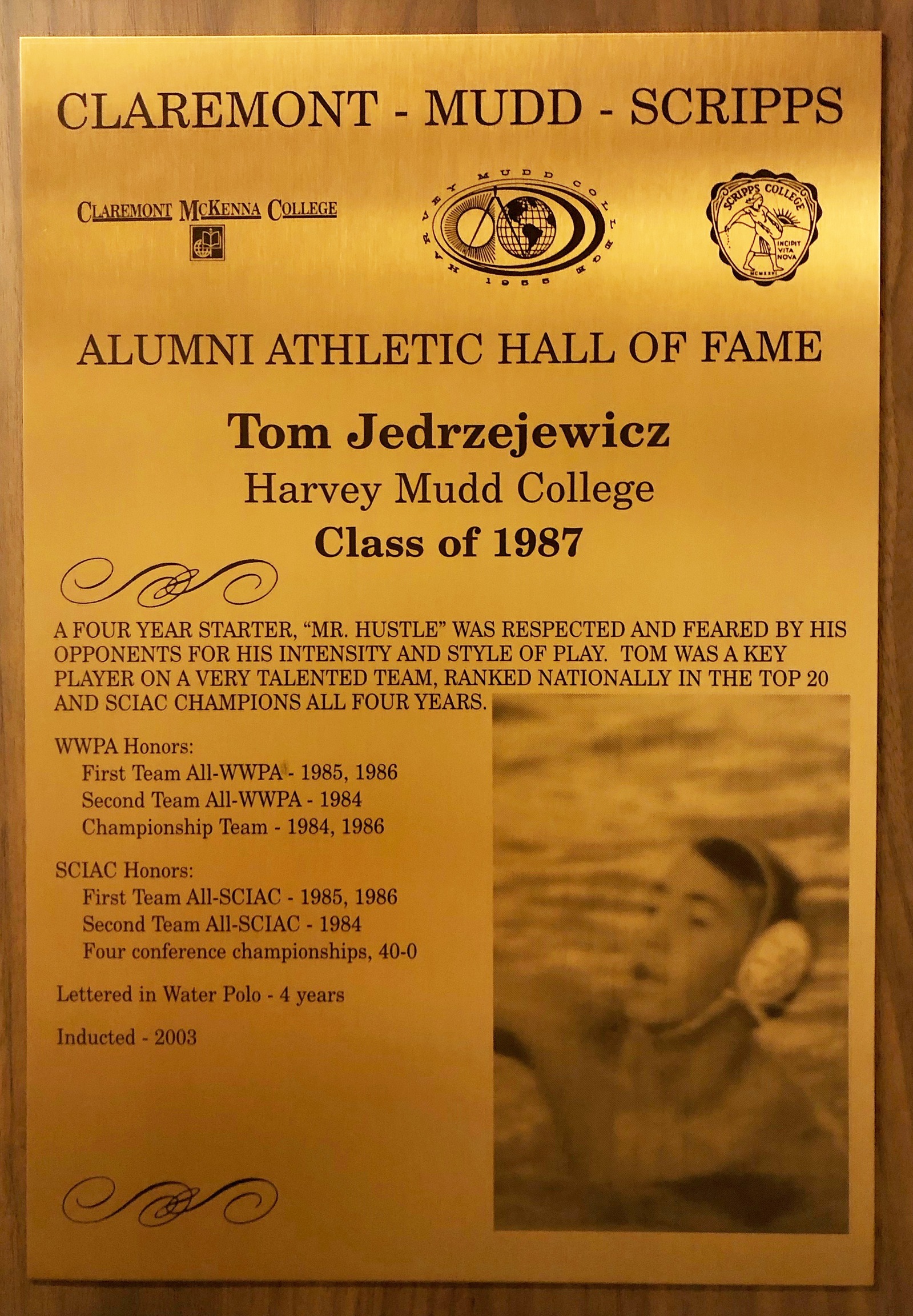 Brad Munroe:
Brad Munroe:
The story of the 1984 Men's Water Polo championship begins in the shadow of defeat. The 1983 team had just lost 7-4 to UCSD in the WWPA final. On the ride home, senior Darren Mierau looked at Mark Grinis and I and said, "You guys are going to be hurting next year." In that moment, it was hard to disagree. Mark and I would be the only returning starters. The 1983 team, whose seniors were the most individually talented group of Stags in the program's history, would graduate five starters and three of the first four subs off the bench. The burden of renewing the habit of excellence lay heavy upon our shoulders.
What none of us realized at the time was the way Stag tradition was self-renewing. The 1984 team saw an infusion of talent rise from within and join from without: Tom "Jedrez" Jedrzejewicz and Tim McNaughton, both freshmen in 1983 who were overshadowed by the talent and force of personality of that year's seniors, blossomed into true studs in the field and in the goal, respectively. Bill "Kareem" Johnson, a starter on the 1982 team, returned after taking a year away from CMC. And then there were the freshmen: "Bobby and the Smurfs," the 1987 seniors who are the greatest class of Stags to ever don the maroon and gold.
When the season started none of us expected we would return to the WWPA final—this humility made us coachable. And damn if Mike Sutton didn't coach us hard. The return of Johnson and the addition of Bob Moore and the cohort of freshmen, all of whom were small but fast swimmers, gave us a team speed absent in 1983. Sutton saw the possibilities for success in this speed before any of us players did, and he worked us like mules—sprint upon sprint upon sprint. Even Grinis, who never saw a sprint he much appreciated and at his best had been a :54 in the 100-yard freestyle, bought into Sutton's vision for the team. By the end of the year, as we were peaking for the WWPA, Grinis went :51 in the 100 free and the rest of the team was under :50, with Johnson and freshmen Todd McKenzie going :47+ in the 100. Our team lacked the individual skills of the 1983 team, but, damn, we were fast!
 Though fast swimmers, we got off to a slow start to the polo season. In successive weekends, we played in the Long Beach State, UCLA, and UC Irvine tourneys, (where we tied UCSD). Following these tournaments, we had an away game with UCSD, traveling to La Jolla, where the Tritons beat us by two to give us a sub-500 record. Still, Sutton made us swim. It would have been tempting to get discouraged and begin to doubt his vision, to begin to grumble, to start to dog it during the brutal end-of-practice sprint sets. It is a testament to the 1984 team's humility and trust in Sutton that none of these things occurred as the season continued. Following a few victories against Division II and III opponents, our final prep game before entering SCIAC play was a rematch with UCSD, this time in Claremont.
Though fast swimmers, we got off to a slow start to the polo season. In successive weekends, we played in the Long Beach State, UCLA, and UC Irvine tourneys, (where we tied UCSD). Following these tournaments, we had an away game with UCSD, traveling to La Jolla, where the Tritons beat us by two to give us a sub-500 record. Still, Sutton made us swim. It would have been tempting to get discouraged and begin to doubt his vision, to begin to grumble, to start to dog it during the brutal end-of-practice sprint sets. It is a testament to the 1984 team's humility and trust in Sutton that none of these things occurred as the season continued. Following a few victories against Division II and III opponents, our final prep game before entering SCIAC play was a rematch with UCSD, this time in Claremont.
The game was in Claremont but not on the CMC campus. Because the old Voit Pool was shorter and narrower (25 yards, six lanes) than championship level pools, UCSD's coach refused to play us at CMC. The game was moved to Claremont High School, which, though also 25 yards, was a wider venue, thus diminishing our home pool advantage. Before the game, Sutton no doubt said something to the team, but what sticks with me are Grinis' words, "No coulda, woulda, shoulda. Let's do this." Inspired, we beat the Tritons 13-11 and gained confidence that we would see them again at the end of the year.
We entered the WWPA ranked fourth among Division II and III schools, even though we had once again swept our SCIAC schedule 10-0 (a part of a consecutive victory streak that would eventually extend past 100). Pomona-Pitzer, as the SCIAC runner-up, was in the field and in our bracket. As Pomona was also our opening round opponent, there was a certain amount of irony that we would both travel to the Stanford campus 400 miles away to play the team from across the street. Pomona was easily dispatched, bringing the 1984 senior class' cumulative record against the Sagehens to 17-0.
The key game in the bracket round came against UC Davis, who was ranked #2 entering the tournament. What was pivotal about the contest was that the winner would face Cal State LA in the semifinals while the loser would face #1 seeded UCSD. Honestly, we didn't want to face UCSD before the finals. And we did not have to because we jumped all over UC Davis, who was no match for our team speed. The first quarter ended 4-1, which I think surprised us and shell-shocked them. At the break, Sutton said to us, "Don't you let them back in this. Don't you dare let up. Now's the time to take it to them." And take it to them we did.
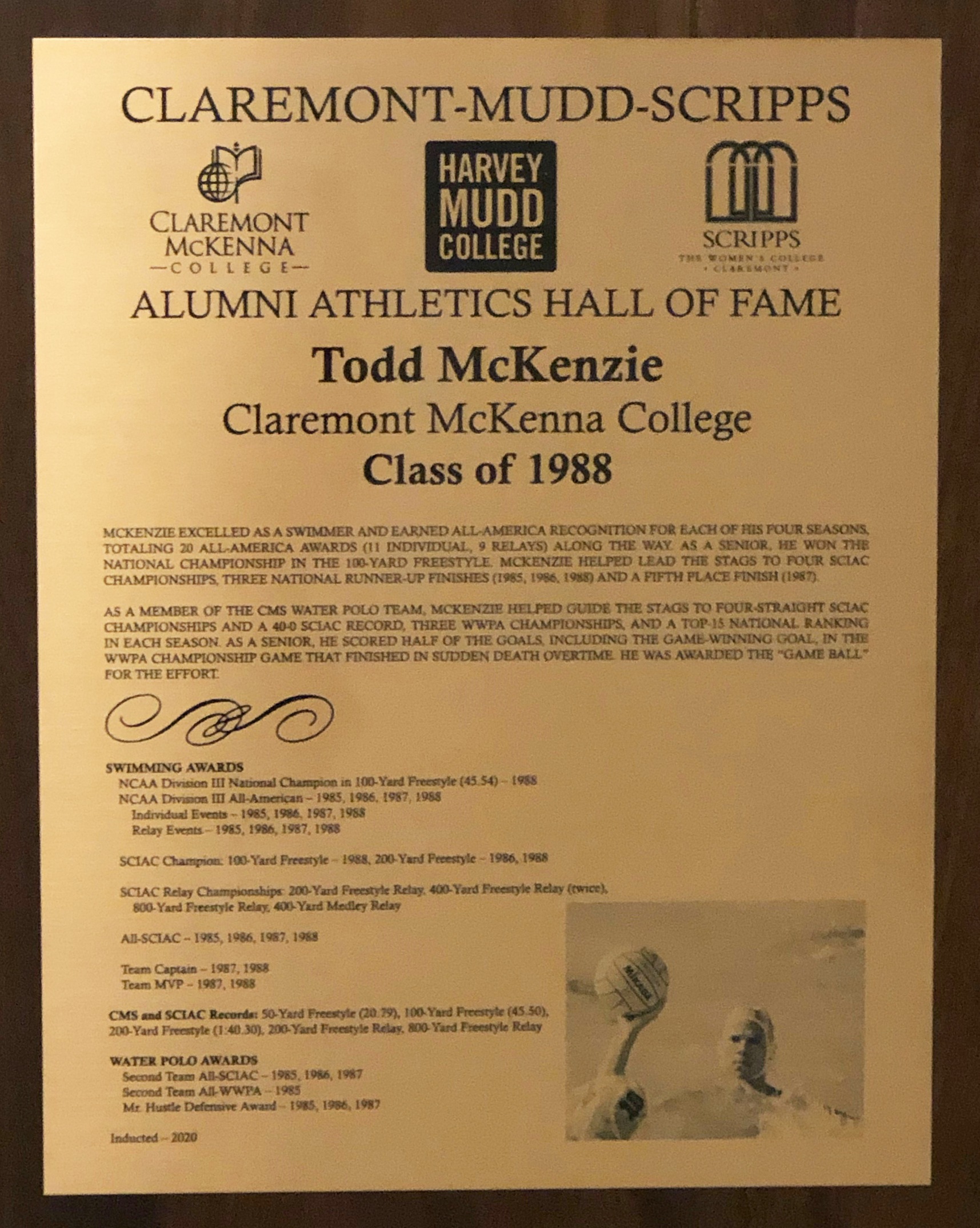 The semifinal game was a bit anti-climactic. We had trounced Cal State LA when we played them at the Irvine tourney, and had beaten them at their pool by a couple, in a game where Grinis and I did not travel due to injuries. Because of the closeness of the second contest, some of their players had confidence, but we were on a roll. For the fourth time in four games at the WWPA, we routed our opponent, setting up the game we were all hoping for: UCSD in the final.
The semifinal game was a bit anti-climactic. We had trounced Cal State LA when we played them at the Irvine tourney, and had beaten them at their pool by a couple, in a game where Grinis and I did not travel due to injuries. Because of the closeness of the second contest, some of their players had confidence, but we were on a roll. For the fourth time in four games at the WWPA, we routed our opponent, setting up the game we were all hoping for: UCSD in the final.
A by-product of the team's humility was an acknowledgement of our strengths and weaknesses and acceptance of our roles. Offensively, Grinis was our undisputed leader, whose outside shot was lethal and his ability to create separation from a defender with only his legs meant he was virtually unguardable both inside and out. Johnson was our sprinter and, at 6'7" (thus the nickname "Kareem"), could elevate above opponents. Johnson played the post in the man-advantage offense, and it was a rather simple pass to throw it high, let him go get it and dunk on the goalie. Other teams knew it was coming and could not stop it. Tim McNaughton, our goalie, was a ball magnet who ignited our fast break.
In 1984 offenses ran through the hole-set position, which Mierau and I played on the 1983 team. Going into 1984, I thought the position would be mine alone. And then I met Bob Moore. In one of our first practices, I was defending against Bob in the hole-set and thought to myself, "I need to work this Rookie," so I used a defensive trick that had been successful before against less seasoned players. Bob's response was to broaden his shoulders, square up, and basically become a brick wall. Needless to say the trick didn't work, and I remember thinking, "Damn, this kid is going to be good." Bob and I shared the hole-set position for the 1984 team.
One of the strengths of the UCSD team was their front court play. Their offensive studs were named Dana, who played hole-set, and Kaz, who was a driver and every bit as fast as Johnson. Sutton had us collapse on Dana and press Kaz, ensuring that if they were going to score it would have to be their lesser players. Defensively, they had this hulk of a guy named Ray, who couldn't swim well but was a brute defensively on the inside. Rather than try to out-muscle him, Sutton had Bob and me set-up as a double hole-set offense, with one of us on each goal post. Whichever guy Ray defended would swim to the wing, with our offense adjusting accordingly. We called it our "Get rid of Ray" play. The first quarter was a stalemate that ended 1-1.
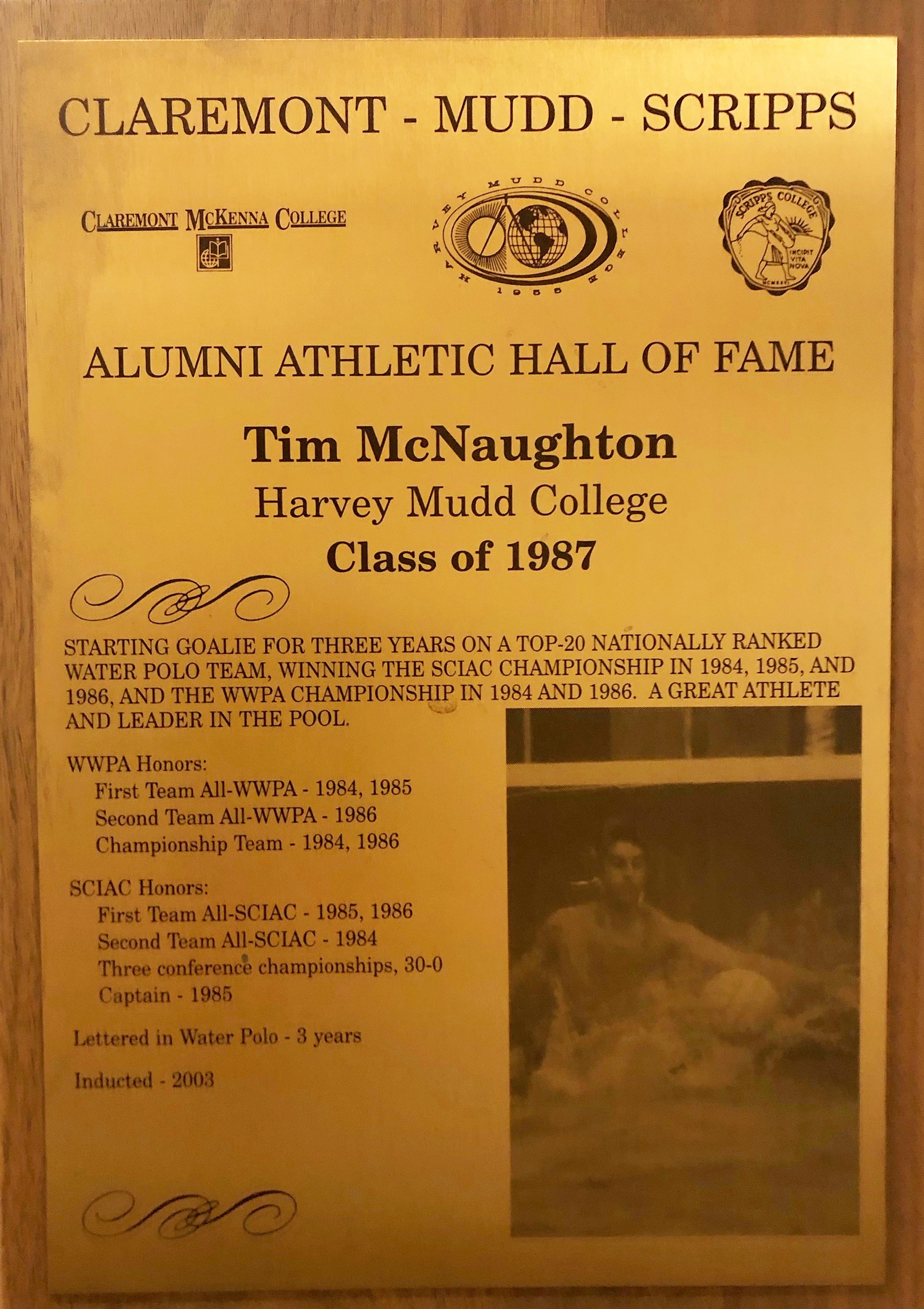 The second quarter was where the magic happened, as our team speed outpaced even UCSD's own quickness. As part of the "Get rid of Ray" play, and through some defensive switching, Ray got stuck guarding Grinis and Johnson on the outside, where Ray's lack of swim speed created an advantage for us. Early in the second quarter Ray was forced to switch on to Grinis—it hardly seemed fair: 2-1. Later in the quarter, Johnson was matched-up defensively with Ray on the outside, which meant that as soon as a Triton shot the ball there would be a race to the other goal between our fastest swimmer and their slowest: 3-1. Finally, with about 30 seconds left in the quarter, Grinis drew an ejection against Dana, who had been trying desperately to keep Grinis close to him and been caught holding during dead time. Coach called for us to take our time and work the clock, which we did, and with about five seconds left in the quarter I passed it high to Kareem: 4-1.
The second quarter was where the magic happened, as our team speed outpaced even UCSD's own quickness. As part of the "Get rid of Ray" play, and through some defensive switching, Ray got stuck guarding Grinis and Johnson on the outside, where Ray's lack of swim speed created an advantage for us. Early in the second quarter Ray was forced to switch on to Grinis—it hardly seemed fair: 2-1. Later in the quarter, Johnson was matched-up defensively with Ray on the outside, which meant that as soon as a Triton shot the ball there would be a race to the other goal between our fastest swimmer and their slowest: 3-1. Finally, with about 30 seconds left in the quarter, Grinis drew an ejection against Dana, who had been trying desperately to keep Grinis close to him and been caught holding during dead time. Coach called for us to take our time and work the clock, which we did, and with about five seconds left in the quarter I passed it high to Kareem: 4-1.
We could sense UCSD's desperation when we came out from halftime. They quickly scored, decreasing our lead to 4-2 but increasing our own sense of urgency. The Division II and III national title, which is how we thought of it, was in the palm of our hand. We would not let it go. The rest of the third quarter and the first half of the fourth quarter are something of a blur. What I remember is us trading goals, with each team's intensity level continuing to increase. With three minutes left in the fourth quarter, UCSD called a time-out with us leading 6-4.
Coming out of the time-out I was matched up with Kaz, their fastest swimmer, who was absolutely maniacal about igniting their fast break. Evidently their coach told them they were not going to be able to comeback by relying on their front court offense, that they needed to fast break. As a team, as soon as a Stag even looked like he were about to shoot, they took off toward their end of the pool. (Credit should be given to their goalie, Duncan Millar, who was left on his own by this strategy.) The strategy worked in that we did not add to our lead but was unsuccessful in that we were able to match their speed. I remember thinking my lungs were about to burst trying to keep pace with Kaz, but also that there was no way in hell I was going to let him beat me down the pool. In hindsight, all those end of practice sprints Sutton made us swim paid off. The game ended 6-4: we were champions.
A side note to the 1984 WWPA is that before we left Claremont, four freshmen were late meeting the team van that would take us to the airport. Sutton was pissed! When the freshmen finally arrived, they each had an ear pierced; said it was for team unity and to show commitment. The freshmen wanted us all to get our ears pierced and, frankly, wouldn't shut up about it. To get them to shut-up and focus on the task at hand, the seniors got together and agreed (for the entire team, by the way), that we would all get our ears pierced if we won the championship.
Following the traditional post-game victory celebration (aka, Sutton was thrown into the pool where we dog piled him, which is hard to do in the water), we pranced off to a suburban mall in Palo Alto in search of an earring store. The girl behind the counter was 16 or 17 and seemed bemused that 20 college guys were lined up to have an ear pierced. It was quite a spectacle.
The final spectacle occurred when we arrived home. We had noted as a team that in the five games we played, four had been won in a rout before dispensing UCSD by two goals. I believe it was Rick Bregman, one of the freshmen, who in the locker room coined what would become our team chant (in the locker room, the mall, on the airplane, in the airport, and, around 1:00 a.m., in the North Quad):
We routed them once! We routed them twice! We routed them three times! We routed them four times! And then we just won, baby, and that's all she wrote.
I have often thought that the 1984 team was special in a uniquely Stag sort of way, where the whole is greater than the sum of the parts and playing for "Capital 'T' Team," as Sutton preached, was more satisfying than playing for one's own benefit. This is the spirit of the 1984 team. We were not the most talented or skilled group of players—that would be the 1983 team, nor were we the best group of seniors—that would be the 1987 seniors who won three out of four WWPAs during their tenure. We were neither the most talented nor the best, merely the first to win it all and bring glory to the Stags.
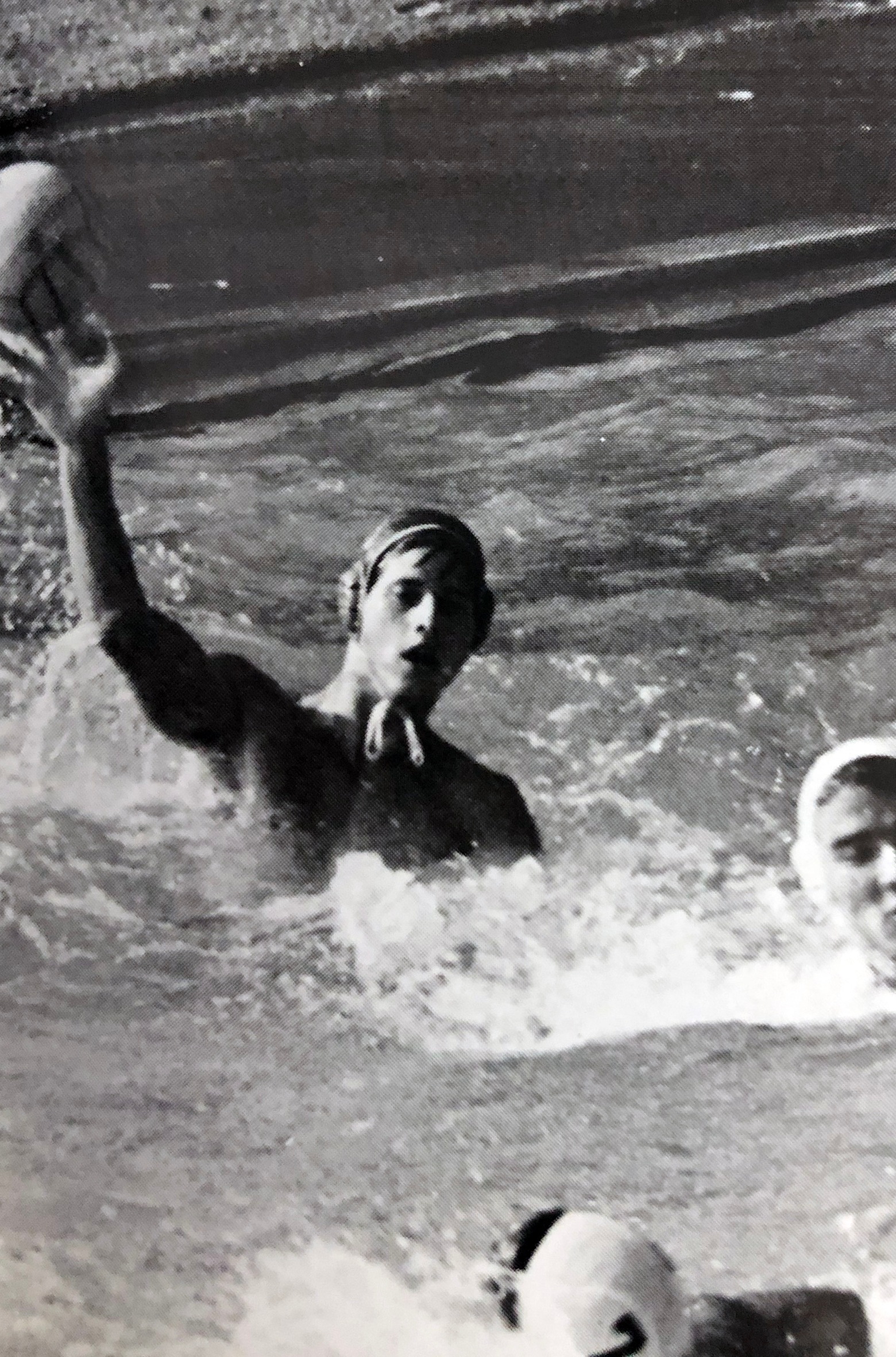 Mark Grinis:
Mark Grinis:
It's hard to add to Brad's comments only to say we had a coach that knew how to bring out the best in each player, while teaching teamwork, focus and to have a blast. That said, we were a team that had learned from James (Hanley), Brad (Bierbaum), Darren (Mierau) and the rest of the (CMS Men's Water Polo Class of 1984), that taught us to give it our all, and "Just Win Baby!"
1984 Men's Water Polo Roster
Head Coach: Mike Sutton
Mark Beckwitt (Jr., CMC)
Rick Bregman (So., CMC)
Chris Cooke (So., CMC)
Lew "Bud" Coppersmith (Fr., CMC)
Jim Cranford (Jr., CMC)
Gary Eisenberg (Sr., CMC)
Mark Grinis (Sr., CMC)
Rick Hall (Fr., HMC)
Steve Haddock (So., HMC)
Tom Jedrzejewicz (So., HMC)
Bill Johnson (Sr., CMC)
Thor Johnson (So., CMC)
Don Kuhn (Fr., CMC)
Todd McKenzie (Fr., CMC)
Tim McNaughton (So., HMC)
Bob Moore (Fr., CMC)
Brad Munroe (Sr., CMC)
David Neault (Sr., CMC)
Mike Nelson (So., CMC)
Eric Rosser (Jr., HMC)
Ed Smith (Fr., CMC)
Tom Vanasse (So., HMC)